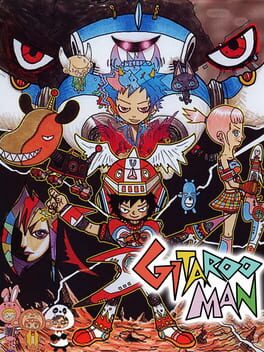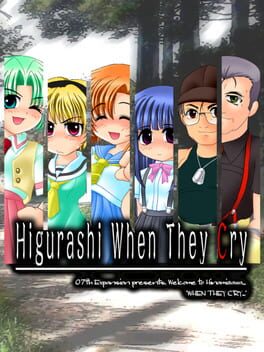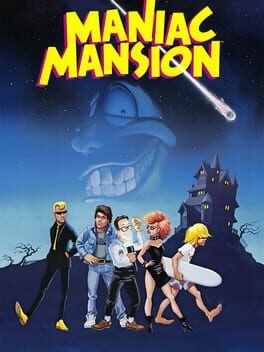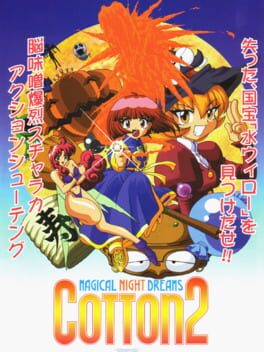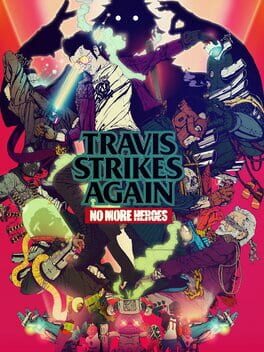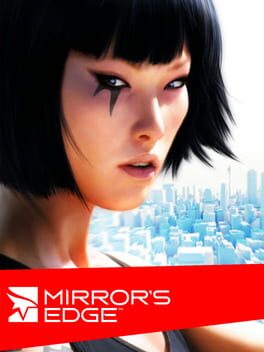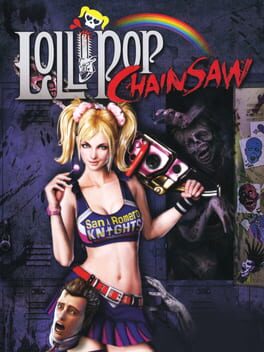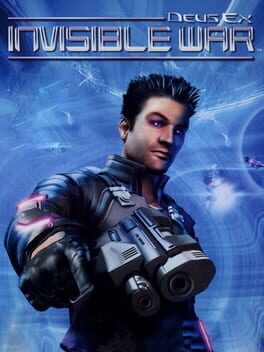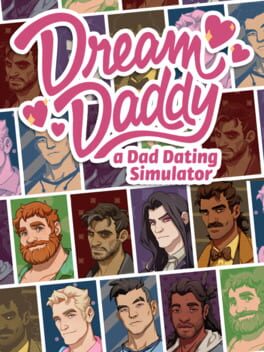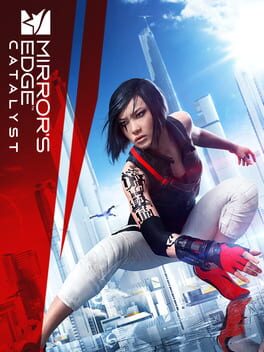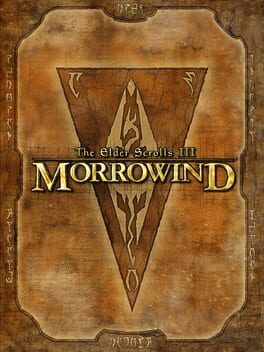214 Reviews liked by anita
i couldnt dislike it as much as i told myself i would, mostly because it is really fun to experience as something i thought i couldnt stand anymore: a story of constant reveals with the eventual goal of having everything explainable in the end. i was not ready for the sheer /volume/ of this 13 sentinels was bringing to the table, in its way more impressive than other plot twisty adventure games it gets compared to, like uchikoshi-written games or danganronpa. it is better at being this kind of thing than those mostly for the unique thrill of being so overwhelmed from many angles, and the way this overwhelmingness works in tandem with being a story about memory and perception is more potentially interesting to me.
but i also could not love 13 sentinels as much as i would like to because, just as i was afraid of, it chose a path of plot dumping at the cost of its character writing. many characters' motivations feel unexpounded on past their tropey origin point, and maybe you can argue theres some sincerity to exploring these tropes but i am not sold by that alone. you are bombarded with information and that means the game doesnt try hard enough to give many of its characters time to breathe beyond moving plot forward. this results in their scenarios often lacking impact as you reach their conclusions, giving me no reason to come around to characters i didnt care for (yakushiji) and sucking the wind out of some of the ones i did (shinonome). and one late game character is barely a character as much as an excuse to tie up loose ends, and the game mechanically admits as much.
this game is genuinely fun when i was there, playing it, and even the combat wasnt a hindrance to that. i dont regret playing it by any means. but looking back i feel like its just an especially good version of strictly concrete [100 intriguey setups = 100 explanation pay offs] type narratives that are always valued as "Best Story" in games, and thats all there was. maybe im not giving credit to its themes expressed thru its kaleidoscope of sci fi ideas but still, would like to have felt something outside of its intellectual exercise.
but i also could not love 13 sentinels as much as i would like to because, just as i was afraid of, it chose a path of plot dumping at the cost of its character writing. many characters' motivations feel unexpounded on past their tropey origin point, and maybe you can argue theres some sincerity to exploring these tropes but i am not sold by that alone. you are bombarded with information and that means the game doesnt try hard enough to give many of its characters time to breathe beyond moving plot forward. this results in their scenarios often lacking impact as you reach their conclusions, giving me no reason to come around to characters i didnt care for (yakushiji) and sucking the wind out of some of the ones i did (shinonome). and one late game character is barely a character as much as an excuse to tie up loose ends, and the game mechanically admits as much.
this game is genuinely fun when i was there, playing it, and even the combat wasnt a hindrance to that. i dont regret playing it by any means. but looking back i feel like its just an especially good version of strictly concrete [100 intriguey setups = 100 explanation pay offs] type narratives that are always valued as "Best Story" in games, and thats all there was. maybe im not giving credit to its themes expressed thru its kaleidoscope of sci fi ideas but still, would like to have felt something outside of its intellectual exercise.
Flores con Historias
2017
Es difícil subestimar los nervios que me atrapaban mientras leía las experiencias en Flores con Historias. Mi experiencia con el proceso que culminó con la legalización del aborto no es tan directa como la de aquellas que se presentaban a las marchas a pelear por este derecho, pero aún así me dan escalofríos.
Habiendo terminado mis estudios secundarios en el año 2020, mismo año en el que finalmente se legalizó el aborto en Argentina, y habiendo desarrollando esta educación a unas cuadras del Congreso donde se hacían las marchas tanto de pañuelos verdes como de pañuelos celestes, pude vivir el impacto social causado por este proceso de legalización de forma muy cercana.
Yo estudié en una escuela técnica, curso completamente populado por hombres. Toda mención del aborto y su legalización era acompañado de chistes misóginos y a su lado, obviamente, las risas y la antipatía. Era la nueva cosa copada de la cual reírse. Era tópico. El odio al feminismo ("feminazismo", como le solían y suelen llamar) en estos espacios es moneda común, así que por supuesto el aborto era un blanco fácil para las burlas. La ESI (Educación Sexual Integral) que el gobierno buscaba instalar en las escuelas era recibida con una falta de seriedad que ya era común para mi.
Puede parecer mucho esperar madurez de pibes de secundaria (aunque cuando las marcha má comunes se volvía, ya estábamos llegando a los 18 años... estábamos grandes), pero me parece importante recalcar como la desinformación y el odio tenía un agarre tan fuerte sobre la población. Esta era la mayor fuente de mi personal impotencia. Era debilitante ver la recepción que tenía, porque sabía que estas ideas idiotas tenían sus raíces en páginas de Facebook cuyo única forma de entretenimiento es alguna variación de "jaja progres/mujeres", que ya se estaban volviendo parte integral de la personalidad de muchos de los pibes con los cuales compartía salón.
Y puede parecer egocentrista tal fijación por mi propia experiencia, pero lo llamo a atención porque me duele pensar en todas las pibas, que habrán pasado por ambientes similares. La impotencia de ver cómo un proceso tan importante para la autonomía de tu cuerpo se reduce a chiste para generar unas risas en el aula, la debilidad causada por los abusos verbales que podía una recibir en la calle solo por portar el pañuelo verde (que a mi hermana le ha pasado varias veces), y el peso de saber que aún si no se legalizaba el aborto, que iba a seguir sucediendo en condiciones miserables.
Quisiera recalcar la elección del autor a poder asignarle años a cada historia. No sé si será producto de mi propia ignorancia (esperemos que no porque si no quedé como un pelotudo), pero le pifié a todas las fechas menos una. Esto me dejó muy, muy claro que a pesar de tener 50 años de distancia entre la primera fecha y la última, las cosas han cambiado poco y nada. Y por eso se debe seguir luchando.
Flores con Historias es una colección de anécdotas. Creo que cada uno de nosotros (aunque me refiero específicamente a los argentinos, reconozco que la lucha por el aborto es también una realidad que muchas más naciones viven), también tenemos una colección así. Ya sean testimonios propios, ajenos, cercanos o lejanos. Duele pensar en todas las personas que no pudieron contar sus historias. La misma descripción del juego te dice que no se puede cambiar el pasado. Pero creo que puede encontrarse refugio en que sí se hizo algo de progreso, y que ahora muchas pibas sí van a poder contarla.
Es ley.
Habiendo terminado mis estudios secundarios en el año 2020, mismo año en el que finalmente se legalizó el aborto en Argentina, y habiendo desarrollando esta educación a unas cuadras del Congreso donde se hacían las marchas tanto de pañuelos verdes como de pañuelos celestes, pude vivir el impacto social causado por este proceso de legalización de forma muy cercana.
Yo estudié en una escuela técnica, curso completamente populado por hombres. Toda mención del aborto y su legalización era acompañado de chistes misóginos y a su lado, obviamente, las risas y la antipatía. Era la nueva cosa copada de la cual reírse. Era tópico. El odio al feminismo ("feminazismo", como le solían y suelen llamar) en estos espacios es moneda común, así que por supuesto el aborto era un blanco fácil para las burlas. La ESI (Educación Sexual Integral) que el gobierno buscaba instalar en las escuelas era recibida con una falta de seriedad que ya era común para mi.
Puede parecer mucho esperar madurez de pibes de secundaria (aunque cuando las marcha má comunes se volvía, ya estábamos llegando a los 18 años... estábamos grandes), pero me parece importante recalcar como la desinformación y el odio tenía un agarre tan fuerte sobre la población. Esta era la mayor fuente de mi personal impotencia. Era debilitante ver la recepción que tenía, porque sabía que estas ideas idiotas tenían sus raíces en páginas de Facebook cuyo única forma de entretenimiento es alguna variación de "jaja progres/mujeres", que ya se estaban volviendo parte integral de la personalidad de muchos de los pibes con los cuales compartía salón.
Y puede parecer egocentrista tal fijación por mi propia experiencia, pero lo llamo a atención porque me duele pensar en todas las pibas, que habrán pasado por ambientes similares. La impotencia de ver cómo un proceso tan importante para la autonomía de tu cuerpo se reduce a chiste para generar unas risas en el aula, la debilidad causada por los abusos verbales que podía una recibir en la calle solo por portar el pañuelo verde (que a mi hermana le ha pasado varias veces), y el peso de saber que aún si no se legalizaba el aborto, que iba a seguir sucediendo en condiciones miserables.
Quisiera recalcar la elección del autor a poder asignarle años a cada historia. No sé si será producto de mi propia ignorancia (esperemos que no porque si no quedé como un pelotudo), pero le pifié a todas las fechas menos una. Esto me dejó muy, muy claro que a pesar de tener 50 años de distancia entre la primera fecha y la última, las cosas han cambiado poco y nada. Y por eso se debe seguir luchando.
Flores con Historias es una colección de anécdotas. Creo que cada uno de nosotros (aunque me refiero específicamente a los argentinos, reconozco que la lucha por el aborto es también una realidad que muchas más naciones viven), también tenemos una colección así. Ya sean testimonios propios, ajenos, cercanos o lejanos. Duele pensar en todas las personas que no pudieron contar sus historias. La misma descripción del juego te dice que no se puede cambiar el pasado. Pero creo que puede encontrarse refugio en que sí se hizo algo de progreso, y que ahora muchas pibas sí van a poder contarla.
Es ley.
Gitaroo Man
2001
improvement starts with oneself, dreams don't whimper into oblivion but instead manifest anew, the impossible becomes possible, a kid can connect with art and in so doing connects with others. it's the diminuitive, meek, naive human form of U-1 that the game describes as a worthy adversary in an in-game appendix, not his gitaroo man form.
shining bright and lighting the way since 2001.
shining bright and lighting the way since 2001.
Higurashi is at its strongest when it is concerned with trauma, both on a personal and a communal level. When it understands the effects trauma can have on someone, and when it dearly wishes to find some way out of the cycles of violence that can so often cause traumatised individuals, groups and generations to, knowingly or unknowingly, condemn others to trauma also. Whilst these are words that don't always apply to Higurashi on a broader level, in its exploration of these themes Higurashi feels both mature and astute; there are so many moments when someone's reaction to the trauma they've experienced or are experiencing feels painfully, heartbreakingly, incisively on-point.
This element of Higurashi is so successful in part because Ryukishi has a deep empathy for his characters. He has an unwillingness to wholly discard someone for their misdeeds, and a deep desire to look inside people and see what makes them tick, what makes people choose the paths they do, and wants you to understand this also. There's one particular instance where I can't bring myself to be onboard with his hardline approach of "hate the sin and not the sinner", and this approach feels to me incongruous with the fact that there are characters in the story that are just wholly irredeemable (Satoko's uncle, for instance), but it's hard to deny there's something compelling about how much Ryukishi cares, and him asking you to try and care just a little bit more too.
Beyond all of this, Higurashi is concerned with generational divides, small village cultures on the edge of being wiped out by modernisation and a fury at the heartlessness of bureaucracy and how it leaves people to drown, with paranoia and fear and the kind of deep, unrelenting love that would have you tear apart everything for someone, with hope and despair and miracles. Higurashi is also concerned with friendship, and despite "the power of friendship" being one of the most worn out and uninspired themes for anime, manga and (I assume) visual novels it actually manages to make such a deeply impassioned plea towards this that I was just entirely hooked in by Higurashi's beating heart.
These are the highs of Higurashi, but it is also ultimately an often-uneven experience. There is a small amount of content here that is indefensible, and which I'm shocked I don't see more condemnation of. Basically any scene set in Angel Mort is just a lock to star creepy sexualisation of teenage girls played up for humour and treated as just completely acceptable, multiple side-character adults in the story make occasional creepy comments along these lines also, and a key character, Irie, is obsessed with the idea of putting one of the game's youngest characters in a maid outfit and marrying her. This content accounts for maybe 3% of the game if I had to guess, so a very minor amount, but it's all just wretched. It's so bizarre too because elsewhere Higurashi is able to render its women with remarkable depth, taking common character archetypes and ultimately subverting just about every expectation you enter with about them in ways that feel natural and which let you really understand how each character ticks by the end of the story, and yet despite this it just can't consistently Be Normal about them at all and just has to have its creepy moments. A couple of the Angel Mort scenes genuinely made me feel a bit ill to read and I would not blame someone for just refusing to read Higurashi because of this content.
More broadly, Higurashi is also desperately in need of a harsher editor at points. Higurashi's eight chapters combined are over one and a half million words long, or longer than reading the entire Lord of the Rings trilogy three times over, and took me 100 hours to finish (which I gather is faster than most people, even). During my readthrough I had multiple extended breaks, which is partially just that my life has been busy this past year, but partially that Higurashi has a habit of stretching out its slice-of-life scenes, confused metaphor-laden inner-monologues and moments of hopeless despair far beyond their point being effectively made. My final break from Higurashi lasted four months, only for me to discover upon my return that the final chapter, beyond a certain point, starts to descend into what feels at times like third-rate fanfiction, and it left me wishing that Ryukishi knew how to communicate his story a little bit more succinctly rather than stretching things on beyond the point where all the intrigue had been quelled and all the questions answered.
A mixed bag, then, but one with a lot to say and a lot it believes in, with an amazing sense of mystery, and some lovable characters that have a lot more going on that you first suspect. Wildly imperfect, at times exhausting or even just reprehensible, but fascinating and with a lot of heart behind its horror. I can't say that I would ever recommend Higurashi, but I did get a lot from the experience.
This element of Higurashi is so successful in part because Ryukishi has a deep empathy for his characters. He has an unwillingness to wholly discard someone for their misdeeds, and a deep desire to look inside people and see what makes them tick, what makes people choose the paths they do, and wants you to understand this also. There's one particular instance where I can't bring myself to be onboard with his hardline approach of "hate the sin and not the sinner", and this approach feels to me incongruous with the fact that there are characters in the story that are just wholly irredeemable (Satoko's uncle, for instance), but it's hard to deny there's something compelling about how much Ryukishi cares, and him asking you to try and care just a little bit more too.
Beyond all of this, Higurashi is concerned with generational divides, small village cultures on the edge of being wiped out by modernisation and a fury at the heartlessness of bureaucracy and how it leaves people to drown, with paranoia and fear and the kind of deep, unrelenting love that would have you tear apart everything for someone, with hope and despair and miracles. Higurashi is also concerned with friendship, and despite "the power of friendship" being one of the most worn out and uninspired themes for anime, manga and (I assume) visual novels it actually manages to make such a deeply impassioned plea towards this that I was just entirely hooked in by Higurashi's beating heart.
These are the highs of Higurashi, but it is also ultimately an often-uneven experience. There is a small amount of content here that is indefensible, and which I'm shocked I don't see more condemnation of. Basically any scene set in Angel Mort is just a lock to star creepy sexualisation of teenage girls played up for humour and treated as just completely acceptable, multiple side-character adults in the story make occasional creepy comments along these lines also, and a key character, Irie, is obsessed with the idea of putting one of the game's youngest characters in a maid outfit and marrying her. This content accounts for maybe 3% of the game if I had to guess, so a very minor amount, but it's all just wretched. It's so bizarre too because elsewhere Higurashi is able to render its women with remarkable depth, taking common character archetypes and ultimately subverting just about every expectation you enter with about them in ways that feel natural and which let you really understand how each character ticks by the end of the story, and yet despite this it just can't consistently Be Normal about them at all and just has to have its creepy moments. A couple of the Angel Mort scenes genuinely made me feel a bit ill to read and I would not blame someone for just refusing to read Higurashi because of this content.
More broadly, Higurashi is also desperately in need of a harsher editor at points. Higurashi's eight chapters combined are over one and a half million words long, or longer than reading the entire Lord of the Rings trilogy three times over, and took me 100 hours to finish (which I gather is faster than most people, even). During my readthrough I had multiple extended breaks, which is partially just that my life has been busy this past year, but partially that Higurashi has a habit of stretching out its slice-of-life scenes, confused metaphor-laden inner-monologues and moments of hopeless despair far beyond their point being effectively made. My final break from Higurashi lasted four months, only for me to discover upon my return that the final chapter, beyond a certain point, starts to descend into what feels at times like third-rate fanfiction, and it left me wishing that Ryukishi knew how to communicate his story a little bit more succinctly rather than stretching things on beyond the point where all the intrigue had been quelled and all the questions answered.
A mixed bag, then, but one with a lot to say and a lot it believes in, with an amazing sense of mystery, and some lovable characters that have a lot more going on that you first suspect. Wildly imperfect, at times exhausting or even just reprehensible, but fascinating and with a lot of heart behind its horror. I can't say that I would ever recommend Higurashi, but I did get a lot from the experience.
The Oregon Trail
1971
Just leaving a note here that this is the original 1971 version that's all text, and the more famous 1985 Apple 2 version with dysentery and such you're probably looking for is at https://www.backloggd.com/games/the-oregon-trail--2 now.
Maniac Mansion
1987
I’m going to slightly spoil a puzzle here: specifically, revealing the arcane process of opening an envelope. In the course of trying to rescue his girlfriend from an evil scientist’s mansion, our hero Dave discovers a hidden envelope with something mysterious inside. Tearing it open to discover its contents, Dave unknowingly kills his girlfriend. The end. Turns out, depending on which two friends were selected to tag along at the start, carelessly tearing open this envelope can quietly leave you with no way to finish. The goal is to open it gingerly enough to be intact for future use, so try to imagine how this might be accomplished. Maybe there could be a letter opener somewhere, or only certain characters are careful enough, or maybe recovering it after giving it to the intended recipient would work… but none of these are correct, and the real answer is to microwave it. It loosens up the glue, opening up the envelope safely. However, I lied, that’s not the real answer, which is to microwave it with a jar full of water next to it to ensure the humidity remains high enough to loosen the glue without burning.
Singling out a puzzle like this is usually to demonstrate some ludicrous moon logic, but Maniac Mansion almost runs too far in the opposite direction. It requires normal Earth logic in such oddly specific ways that it’s almost equally opaque, but that’s sorta why I love it. It’s not like you’re in a realm of magic and fairy tales that builds off references and genre assumptions, the most difficult solutions actually require fairly mundane reasoning to solve. The house is just a small, singular location, so it’s easy to find all your tools quickly, and start theorizing the uses for each character. It’s common to come across a new item and think “Ah, if I get stuck, I can bring this other character next time and try that” and slowly learn the extent of the possibilities. That’s why the aforementioned softlocks are so heartbreaking, since they’re the only factor that prevent this from being a perfect genre entry point. It gets even more complicated when considering the version differences, like how ruining the envelope was considered too brutal to include in the NES port, and was removed. However, the interface doesn’t work well with a controller and many details were censored, so there’s no way around some awkwardness. If you’re coming into it cold, I would recommend playing the 1989 PC version and including Bernard in your trio, since he’s accepted as contributing to the smoothest route and doesn’t require any envelope microwaving. And really, I do recommend it in spite of the issues; I think its concept for a small-scale but layered adventure game is one that still holds a lot of promise. I would love to try some indie games that put their unique spin on the idea, at least in a way that doesn’t involve me despondently sitting in front of a microwave any more than I already do.
Singling out a puzzle like this is usually to demonstrate some ludicrous moon logic, but Maniac Mansion almost runs too far in the opposite direction. It requires normal Earth logic in such oddly specific ways that it’s almost equally opaque, but that’s sorta why I love it. It’s not like you’re in a realm of magic and fairy tales that builds off references and genre assumptions, the most difficult solutions actually require fairly mundane reasoning to solve. The house is just a small, singular location, so it’s easy to find all your tools quickly, and start theorizing the uses for each character. It’s common to come across a new item and think “Ah, if I get stuck, I can bring this other character next time and try that” and slowly learn the extent of the possibilities. That’s why the aforementioned softlocks are so heartbreaking, since they’re the only factor that prevent this from being a perfect genre entry point. It gets even more complicated when considering the version differences, like how ruining the envelope was considered too brutal to include in the NES port, and was removed. However, the interface doesn’t work well with a controller and many details were censored, so there’s no way around some awkwardness. If you’re coming into it cold, I would recommend playing the 1989 PC version and including Bernard in your trio, since he’s accepted as contributing to the smoothest route and doesn’t require any envelope microwaving. And really, I do recommend it in spite of the issues; I think its concept for a small-scale but layered adventure game is one that still holds a lot of promise. I would love to try some indie games that put their unique spin on the idea, at least in a way that doesn’t involve me despondently sitting in front of a microwave any more than I already do.
I've been pushing for Cotton to be the mascot of Backloggd for the best part of a year now and the intro of this game featuring her bio that states "Age: Unknown. Mental age: 5" is validation for that. Accept her as the symbol for what you are - a hungry little scamp and rascal.
Anyway, this is great. Played the recently released fan translation and was blown away by how fun this shmup is from front to back. A core universal grabbing and throwing mechanic on top of a general focus on physics-based nonsense makes Cotton 2 so much more tactile and openly comedic than most other Shmups I've ever played. Particularly adore the cutscenes inbetween misisons using squash and stretch principles applied to comic book panels, it's all shockingly unique and easy to love.
Anyway, this is great. Played the recently released fan translation and was blown away by how fun this shmup is from front to back. A core universal grabbing and throwing mechanic on top of a general focus on physics-based nonsense makes Cotton 2 so much more tactile and openly comedic than most other Shmups I've ever played. Particularly adore the cutscenes inbetween misisons using squash and stretch principles applied to comic book panels, it's all shockingly unique and easy to love.
This review contains spoilers
"There's a tendency among the press to attribute the creation of a game to a single person," says Warren Spector, creator of Thief and Deus Ex. - IGN Staff, 2001
I may have ruined this one for myself, and that's the worst thing.
I bought Travis Strikes Again: No More Heroes shortly after it came out. Not immediately after, as I was still knee-deep in exams, but a couple of months after. Just enough time for consensus to percolate on the game. And when I posted about beginning to play the game, that consensus was clear:
"You really should play The Silver Case, Flower Sun and Rain, and The 25th Ward if you want to get the most out of this."
And, somehow, I believed this completely ludicrous statement. And Travis Strikes Again sat on my shelf, waiting to be played, as I went through those three games one by one, as the expectations in my head for this game were built by the effusive words of those around me, until finally, just about a month ago, I finished The 25th Ward and sat down to play Travis Strikes Again. It's possible that the letdown was inevitable.
(incidentally, if you're anything like me in 2019, first of all, good luck, second of all, don't make my mistake, and just play this game. The Silver Cases and FSR are fabulous games well worth playing, far more so than this one for my money, but all you're really missing out on is references on par with that you'd find in a typical MCU film, and since I personally find that kind of indulgent key-jangling reference kind of annoying, I think knowing who Kurumizawa is, for example, actually made me like this game a bit less, because I understood how shallow the reference really was.)
Sorry. I got distracted. Where was I?
I have two fundamental issues with TSA. The first is how insubstantial it is. It's not like there aren't great things in this game: there are. But they take up so little of the experience in terms of sheer volume. Dialogue is sparse, and dialogue that actually hits is even sparser among that, and it really feels like so much of the game is trudging through treacle to reach those nuggets of gold. This game is far, far too long, easily twice the length it needed to be. If this was a 2-3 hour game, like so many of the referenced indie games that Grasshopper holds an obvious amount of affection for, I think I might love it. But as it stands, as a game that can last anywhere from 8-12 hours, it's hard to shake the feeling that so little of that time is spent experiencing things that are valuable and actually say anything that hits.
The problem with the gameplay is not necessarily that it is tedious. Tedious gameplay is not new to the No More Heroes series. The problem is that the gameplay here is not purposeful. Even if it was incredibly fun - I didn't find it to be so, personally - it would still have the same issue: the gameplay doesn't work with the story so much as just feel in the way of it: the almost never-changing gameplay loop sands down the supposed unique character between the games Travis is playing and makes me wonder what exactly he sees in them. I didn't learn much of anything about these games or about Travis through massacring hordes of identical bugmen, and the way the gameplay has almost no verbs apart from that leaves every game world feeling hollow and empty, without the capability to engage with these spaces as spaces, none of them feel appreciably different from each other, or, indeed, from the abstract maze that lies at the end of the game. It just felt perfunctory, obligatory, lacking any weight or purpose, or meaning.
And I could maybe tolerate this if the dialogue we were fighting through all this to reach was solid gold but most of the time it just isn't. The most demonstrative level for this issue is the much-discussed Serious Moonlight - which - as you already know, of course - is actually an extended reference to Shadows of the Damned. I say "reference to" rather than "sequel to" or "meditation on" because it's very hard for me to take seriously that this level says anything of major substance about that game or the development process behind it. The only thing even slightly aiming at that is the intro sequence where - according to someone on discord - Garcia Fucking Hotspur is killed by a prototype version of his character, from back when the game was called Kurayami. If I hadn't known that tidbit, I don't know if I would have intimated even slightly that this was a game Suda51 and Grasshopper Manufacture feel divided about, or, indeed, one that has been remembered pretty poorly. Because the rest of the level is just a love-in for the three or four Shadows of the Damned fans that exist. White Sheepman's musing's on the game are just factoids of things that happen in the game without any commentary that isn't just basic praise, and Travis won't stop talking about how cool Garcia is, and the premise of the entire level is that the genius auteur (we'll get back to this) Dr.Juvenile saw it in a dream and loved it so much she made a sequel to it before it even came out.
None of this is reacting to or engaging with the legacy of Shadows of the Damned as it actually existed: a financial disaster that got good reviews at the time but is remembered poorly if at all today, instead it mythologizes Shadows of the Damned as a misunderstood masterpiece with a cult following. There is no reflection on the game's outrageous misogyny, bad jokes, and disastrous development that resulted in a game that seemingly no one (except, apparently, Akira Yamaoka) involved wanted to make. I can see why, for people who have invested a huge amount into Suda, that know the history of Grasshopper Manufacture inside and out, that the mere presence of this level in this game can invite reflections on the ghost of Kurayami and what might have been, but the game doesn't inspire those thoughts on its own. It doesn't let me in.
There's no room for me here. There's only room for Grasshopper, and those so invested in them that they can fill in the myriad gaps TSA leaves behind.
Travis Strikes Again does not feel like a coherent, unified thesis on much of anything. It feels like a sketchbook, a collection of ideas, often evocative, enthralling ideas (god I cannot express how much I wish the game explored more deeply its brief flirtations with the intersection of US state violence and the videogame industry), that never congeal together into something that completely resonates. This is Grasshopper Manufacture's Unfinished Tales, or The Salmon of Doubt, posthumous writings from a period in their history they are drawing a line under here. And in the abstract, y'know, I like that. I like the sound of that.
I just wish I played this game sooner. I wish I played it in 2019, and not in 2021. Because times have changed, and I have too. And I can no longer simply take this game's musings with the earnest spirit with which they were so clearly intended.
If Travis Strikes Again has any coherent overriding theme, it is the concept of the Auteur. The real story we're experiencing here is Travis Touchdown exploring the work of legendary game developer Dr.Juvenile and beginning to feel like he can understand her through her games, until he comes face to face with her digital ghost, living on in the games, at the end. He is, essentially, doing an auteur reading on Juvenile and her games, bordering on psychoanalysis.
This is one of the most popular ways to read art, and is certainly the most popular way to read the games with Suda51's involvement. Nonetheless, it's something I try to avoid doing. The majority of games are a collaborative medium, with anywhere from a dozen to a hundred developers working on a game, each talented and creative people in their own right, and while I won't say that directors don't have an appreciable style that can't be gleaned from their work, the tendency to attribute a game to a single creative voice is something that I have always been cynical about and have completely turned against over the past two years.
How many Michel Ancels, how many Neil Druckmanns, how many John Carmacks, how many Chris Avellones or Jesse McCrees, how many David Cages do we have to see revealed to be toxic individuals who use the cult of personality around them to abuse their staff and wield their myth like a knife to harm those around them before we rid ourselves of the image of the genius auteur whose flaws only serve to highlight their impossible genius? How many more people in this industry have to be hurt before we rid ourselves of the specter of Dr.Juvenile?
When the games of the Death Drive Mk II are discussed, they are always discussed as Juvenile's games. The games are her vision, and anything that is not her vision was a compromise placed upon it by the restrictions of technology or moneymen or other outside forces impeding on her art. She wasn't a solo developer, for whom this claim might hold some water: we are explicitly told she had a team working with her, one that wanted to fulfill her vision. But what about their vision? Where are the Jun Fukadas, whose superb sound design is about all that makes the gameplay loop of TSA tolerable? The Ren Yamazakis, who is credited as co-director alongside Goichi Suda, yet I don't see anyone effusing about his return? The Hajime Kishiis, the Takashi Kasaharas? They aren't here. They exist, but their vision is not allowed to intrude upon these games. There is no space for anything else in them, no space for anyone else. They simply exist to attempt to fulfill Juvenile's creative vision, even when such creative vision is obscured in such a way we are encouraged to read as being emblematic of her ahead-of-the-curve genius, but reads less romantically as someone who was hopeless at managing projects and a nightmare to work under.
(there is one concrete person who worked with Juvenile on the games themselves that we encounter, and it's an, uh, interesting choice of TSA to use that character to characterize the degree to which EA meddled with the development of Shadows of the Damned as a man beating a woman to within an inch of her life. Real fucking classy, man. And, no, I don't think I'm being ungenerous with that read, given how close the game aligns itself with Juvenile and the fact that the character in question has the exact same name as John Riccitello, CEO of EA during Shadows' development, with a couple of letters changed in the first name, who has actually been accused of sexual harassment by a co-worker at Unity, which just compounds the grossness of this. I'm sorry Kurayami didn't turn out how you wanted. But that isn't the same as being physically abused by John Riccitello.)
I cannot buy into the narrative of Dr.Juvenile as an effusive genius ahead of her time because all I see when I look at her story is the uncritical recitation of a myth that has caused genuine, real harm to people. A myth that you would think that Grasshopper Manufacture would know better than to buy into, given how games with relatively little involvement from Suda51 have used his name to market games that would ultimately contribute to tanking the company's reputation in the eyes of all but the most dedicated fans. This doesn't mean my sympathy lies with the corporate moneymen either: what I want is a recognition of games (again, solo projects aside) as a team effort made my diverse voices performing genuine labour to will these impossible things, all the more special and characterful for their flaws, into life. And TSA just...doesn't.
I don't think this game is presenting this viewpoint maliciously, or deliberately, to be clear. But I think it is the result of this self-indulgent, uncritically reflective game that truly lacks the bite it really needs. It's not a terrible game. I'm glad it exists, despite all the shit I've talked about it here. And I admire and respect it greatly, in a certain way, and I completely understand the people for whom this game truly was a deeply meaningful experience. This would be a lesser medium if not for Travis Strikes Again. It's a masturbatory game, but I don't mean that entirely as negatively as the connotations of that word would imply. We all need to let off some steam every once in a while.
But you can't expect me to get much out of it.
I may have ruined this one for myself, and that's the worst thing.
I bought Travis Strikes Again: No More Heroes shortly after it came out. Not immediately after, as I was still knee-deep in exams, but a couple of months after. Just enough time for consensus to percolate on the game. And when I posted about beginning to play the game, that consensus was clear:
"You really should play The Silver Case, Flower Sun and Rain, and The 25th Ward if you want to get the most out of this."
And, somehow, I believed this completely ludicrous statement. And Travis Strikes Again sat on my shelf, waiting to be played, as I went through those three games one by one, as the expectations in my head for this game were built by the effusive words of those around me, until finally, just about a month ago, I finished The 25th Ward and sat down to play Travis Strikes Again. It's possible that the letdown was inevitable.
(incidentally, if you're anything like me in 2019, first of all, good luck, second of all, don't make my mistake, and just play this game. The Silver Cases and FSR are fabulous games well worth playing, far more so than this one for my money, but all you're really missing out on is references on par with that you'd find in a typical MCU film, and since I personally find that kind of indulgent key-jangling reference kind of annoying, I think knowing who Kurumizawa is, for example, actually made me like this game a bit less, because I understood how shallow the reference really was.)
Sorry. I got distracted. Where was I?
I have two fundamental issues with TSA. The first is how insubstantial it is. It's not like there aren't great things in this game: there are. But they take up so little of the experience in terms of sheer volume. Dialogue is sparse, and dialogue that actually hits is even sparser among that, and it really feels like so much of the game is trudging through treacle to reach those nuggets of gold. This game is far, far too long, easily twice the length it needed to be. If this was a 2-3 hour game, like so many of the referenced indie games that Grasshopper holds an obvious amount of affection for, I think I might love it. But as it stands, as a game that can last anywhere from 8-12 hours, it's hard to shake the feeling that so little of that time is spent experiencing things that are valuable and actually say anything that hits.
The problem with the gameplay is not necessarily that it is tedious. Tedious gameplay is not new to the No More Heroes series. The problem is that the gameplay here is not purposeful. Even if it was incredibly fun - I didn't find it to be so, personally - it would still have the same issue: the gameplay doesn't work with the story so much as just feel in the way of it: the almost never-changing gameplay loop sands down the supposed unique character between the games Travis is playing and makes me wonder what exactly he sees in them. I didn't learn much of anything about these games or about Travis through massacring hordes of identical bugmen, and the way the gameplay has almost no verbs apart from that leaves every game world feeling hollow and empty, without the capability to engage with these spaces as spaces, none of them feel appreciably different from each other, or, indeed, from the abstract maze that lies at the end of the game. It just felt perfunctory, obligatory, lacking any weight or purpose, or meaning.
And I could maybe tolerate this if the dialogue we were fighting through all this to reach was solid gold but most of the time it just isn't. The most demonstrative level for this issue is the much-discussed Serious Moonlight - which - as you already know, of course - is actually an extended reference to Shadows of the Damned. I say "reference to" rather than "sequel to" or "meditation on" because it's very hard for me to take seriously that this level says anything of major substance about that game or the development process behind it. The only thing even slightly aiming at that is the intro sequence where - according to someone on discord - Garcia Fucking Hotspur is killed by a prototype version of his character, from back when the game was called Kurayami. If I hadn't known that tidbit, I don't know if I would have intimated even slightly that this was a game Suda51 and Grasshopper Manufacture feel divided about, or, indeed, one that has been remembered pretty poorly. Because the rest of the level is just a love-in for the three or four Shadows of the Damned fans that exist. White Sheepman's musing's on the game are just factoids of things that happen in the game without any commentary that isn't just basic praise, and Travis won't stop talking about how cool Garcia is, and the premise of the entire level is that the genius auteur (we'll get back to this) Dr.Juvenile saw it in a dream and loved it so much she made a sequel to it before it even came out.
None of this is reacting to or engaging with the legacy of Shadows of the Damned as it actually existed: a financial disaster that got good reviews at the time but is remembered poorly if at all today, instead it mythologizes Shadows of the Damned as a misunderstood masterpiece with a cult following. There is no reflection on the game's outrageous misogyny, bad jokes, and disastrous development that resulted in a game that seemingly no one (except, apparently, Akira Yamaoka) involved wanted to make. I can see why, for people who have invested a huge amount into Suda, that know the history of Grasshopper Manufacture inside and out, that the mere presence of this level in this game can invite reflections on the ghost of Kurayami and what might have been, but the game doesn't inspire those thoughts on its own. It doesn't let me in.
There's no room for me here. There's only room for Grasshopper, and those so invested in them that they can fill in the myriad gaps TSA leaves behind.
Travis Strikes Again does not feel like a coherent, unified thesis on much of anything. It feels like a sketchbook, a collection of ideas, often evocative, enthralling ideas (god I cannot express how much I wish the game explored more deeply its brief flirtations with the intersection of US state violence and the videogame industry), that never congeal together into something that completely resonates. This is Grasshopper Manufacture's Unfinished Tales, or The Salmon of Doubt, posthumous writings from a period in their history they are drawing a line under here. And in the abstract, y'know, I like that. I like the sound of that.
I just wish I played this game sooner. I wish I played it in 2019, and not in 2021. Because times have changed, and I have too. And I can no longer simply take this game's musings with the earnest spirit with which they were so clearly intended.
If Travis Strikes Again has any coherent overriding theme, it is the concept of the Auteur. The real story we're experiencing here is Travis Touchdown exploring the work of legendary game developer Dr.Juvenile and beginning to feel like he can understand her through her games, until he comes face to face with her digital ghost, living on in the games, at the end. He is, essentially, doing an auteur reading on Juvenile and her games, bordering on psychoanalysis.
This is one of the most popular ways to read art, and is certainly the most popular way to read the games with Suda51's involvement. Nonetheless, it's something I try to avoid doing. The majority of games are a collaborative medium, with anywhere from a dozen to a hundred developers working on a game, each talented and creative people in their own right, and while I won't say that directors don't have an appreciable style that can't be gleaned from their work, the tendency to attribute a game to a single creative voice is something that I have always been cynical about and have completely turned against over the past two years.
How many Michel Ancels, how many Neil Druckmanns, how many John Carmacks, how many Chris Avellones or Jesse McCrees, how many David Cages do we have to see revealed to be toxic individuals who use the cult of personality around them to abuse their staff and wield their myth like a knife to harm those around them before we rid ourselves of the image of the genius auteur whose flaws only serve to highlight their impossible genius? How many more people in this industry have to be hurt before we rid ourselves of the specter of Dr.Juvenile?
When the games of the Death Drive Mk II are discussed, they are always discussed as Juvenile's games. The games are her vision, and anything that is not her vision was a compromise placed upon it by the restrictions of technology or moneymen or other outside forces impeding on her art. She wasn't a solo developer, for whom this claim might hold some water: we are explicitly told she had a team working with her, one that wanted to fulfill her vision. But what about their vision? Where are the Jun Fukadas, whose superb sound design is about all that makes the gameplay loop of TSA tolerable? The Ren Yamazakis, who is credited as co-director alongside Goichi Suda, yet I don't see anyone effusing about his return? The Hajime Kishiis, the Takashi Kasaharas? They aren't here. They exist, but their vision is not allowed to intrude upon these games. There is no space for anything else in them, no space for anyone else. They simply exist to attempt to fulfill Juvenile's creative vision, even when such creative vision is obscured in such a way we are encouraged to read as being emblematic of her ahead-of-the-curve genius, but reads less romantically as someone who was hopeless at managing projects and a nightmare to work under.
(there is one concrete person who worked with Juvenile on the games themselves that we encounter, and it's an, uh, interesting choice of TSA to use that character to characterize the degree to which EA meddled with the development of Shadows of the Damned as a man beating a woman to within an inch of her life. Real fucking classy, man. And, no, I don't think I'm being ungenerous with that read, given how close the game aligns itself with Juvenile and the fact that the character in question has the exact same name as John Riccitello, CEO of EA during Shadows' development, with a couple of letters changed in the first name, who has actually been accused of sexual harassment by a co-worker at Unity, which just compounds the grossness of this. I'm sorry Kurayami didn't turn out how you wanted. But that isn't the same as being physically abused by John Riccitello.)
I cannot buy into the narrative of Dr.Juvenile as an effusive genius ahead of her time because all I see when I look at her story is the uncritical recitation of a myth that has caused genuine, real harm to people. A myth that you would think that Grasshopper Manufacture would know better than to buy into, given how games with relatively little involvement from Suda51 have used his name to market games that would ultimately contribute to tanking the company's reputation in the eyes of all but the most dedicated fans. This doesn't mean my sympathy lies with the corporate moneymen either: what I want is a recognition of games (again, solo projects aside) as a team effort made my diverse voices performing genuine labour to will these impossible things, all the more special and characterful for their flaws, into life. And TSA just...doesn't.
I don't think this game is presenting this viewpoint maliciously, or deliberately, to be clear. But I think it is the result of this self-indulgent, uncritically reflective game that truly lacks the bite it really needs. It's not a terrible game. I'm glad it exists, despite all the shit I've talked about it here. And I admire and respect it greatly, in a certain way, and I completely understand the people for whom this game truly was a deeply meaningful experience. This would be a lesser medium if not for Travis Strikes Again. It's a masturbatory game, but I don't mean that entirely as negatively as the connotations of that word would imply. We all need to let off some steam every once in a while.
But you can't expect me to get much out of it.
Mirror's Edge
2008
Much more restrictive than I realised in previous playthroughs, but I come back to it once every two-three years, and every time I'm faster and have more flow.
Don't know why, but this may be one of the few ultra-clean ultra-saturated aesthetics I absolutely love. An outlier in a generation full of murky AAA.
Don't know why, but this may be one of the few ultra-clean ultra-saturated aesthetics I absolutely love. An outlier in a generation full of murky AAA.
Lollipop Chainsaw
2012
(Slight content warning: Some of the work discussed here isn’t exact safe for work, for a variety of reasons. I chose not to link to anything, but if you dig on your own… y’know. Look Out.)
There’s always a difficulty in viewing works like Lollipop Chainsaw through an analytical lens. On a surface level, the game spews out vicious bloodshed and references-disguised-as-jokes by way of a barely-legal blonde bombshell voiced by Tara Strong, hot off the presses from the seven other games she acted in that year. Cutting deeper, breaking the skin of easy T&A and lukewarm comedy, the blood of the B-movie flows freely, an exhumed exploitation expression bearing the scars of grindhouse cinema. With inspirations ranging from splatter horror and the impressively-direct sexploitation subgenre, and spearheaded by self-proclaimed punk Suda51 and Troma alumni James Gunn, Lollipop Chainsaw is, for better or worse, the same sort of gore-soaked titillation that swept through drive-in theaters and low-budget dive cinemas in the 1960s and 70s.
But, pray-tell, what makes it fit among the prestige derived from that lineage, you may ask? What aligns Lollipop Chainsaw with hallmarks of the genre, with Faster, Pussycat! Kill! Kill! or Cannibal Holocaust? In what way is this game different from the legions of flavor-of-the-month titty games that drop from the garbage shoot that is steam, or the waves of ultraviolent mass murder simulators washing ashore from untold origins? How is it better? How is it worse?
That’s the problem; there is no real distinction. No marks of quality, no big-time writers or esteemed directors could change the fact that the “trash games” of today are, simply, an extension of the “trash cinema” of yesterday. When removed from the context of “children’s plaything” or “unique audiovisual medium”, video games take on the language and identity we ascribe to thousands of films, plays, and books. Looking at work churned out by multi-million entertainment conglomerates, you see the hallmarks of mainstream film being used as the benchmark for excellence. As an interactive mode of expression, it’s inevitable that games go beyond the realm of what is acceptable to a mainstream audience, venturing into the grimey, the messy, the extreme. After all, what is Senran Kagura if not an extrapolation of The Switchblade Sisters? What is Splatterhouse if not the logical conclusion of Hausu?
Now, I understand that this may all come off as statements dreamed up by the utterly deranged, that this could be the result of introspection and pretension too far gone to consider. Before I am soundly laughed out of the Backloggd community, consider: In the Wider Gaming Community’s push for video games to be viewed as art, isn't it also important to appreciate that which goes beyond the traditional accepted view of art? The existence of sleazy slashers and lowbrow smut doesn’t revoke the existence of time-honored masterpieces in film, in written pieces, even in the work of playwrights dating back to ancient times. As the acceptance of gaming as artwork, whatever that truly entails, dawns near, is it fair to deride the messier side of the medium as unapproachable, of being unworthy of contemplative thought? Does Lollipop Chainsaw and its ilk deserve its branding as something holding back serious discussion of gaming, or is that simply an indication of the immaturity of not only the medium, but of criticism around it?
There’s always a difficulty in viewing works like Lollipop Chainsaw through an analytical lens. On a surface level, the game spews out vicious bloodshed and references-disguised-as-jokes by way of a barely-legal blonde bombshell voiced by Tara Strong, hot off the presses from the seven other games she acted in that year. Cutting deeper, breaking the skin of easy T&A and lukewarm comedy, the blood of the B-movie flows freely, an exhumed exploitation expression bearing the scars of grindhouse cinema. With inspirations ranging from splatter horror and the impressively-direct sexploitation subgenre, and spearheaded by self-proclaimed punk Suda51 and Troma alumni James Gunn, Lollipop Chainsaw is, for better or worse, the same sort of gore-soaked titillation that swept through drive-in theaters and low-budget dive cinemas in the 1960s and 70s.
But, pray-tell, what makes it fit among the prestige derived from that lineage, you may ask? What aligns Lollipop Chainsaw with hallmarks of the genre, with Faster, Pussycat! Kill! Kill! or Cannibal Holocaust? In what way is this game different from the legions of flavor-of-the-month titty games that drop from the garbage shoot that is steam, or the waves of ultraviolent mass murder simulators washing ashore from untold origins? How is it better? How is it worse?
That’s the problem; there is no real distinction. No marks of quality, no big-time writers or esteemed directors could change the fact that the “trash games” of today are, simply, an extension of the “trash cinema” of yesterday. When removed from the context of “children’s plaything” or “unique audiovisual medium”, video games take on the language and identity we ascribe to thousands of films, plays, and books. Looking at work churned out by multi-million entertainment conglomerates, you see the hallmarks of mainstream film being used as the benchmark for excellence. As an interactive mode of expression, it’s inevitable that games go beyond the realm of what is acceptable to a mainstream audience, venturing into the grimey, the messy, the extreme. After all, what is Senran Kagura if not an extrapolation of The Switchblade Sisters? What is Splatterhouse if not the logical conclusion of Hausu?
Now, I understand that this may all come off as statements dreamed up by the utterly deranged, that this could be the result of introspection and pretension too far gone to consider. Before I am soundly laughed out of the Backloggd community, consider: In the Wider Gaming Community’s push for video games to be viewed as art, isn't it also important to appreciate that which goes beyond the traditional accepted view of art? The existence of sleazy slashers and lowbrow smut doesn’t revoke the existence of time-honored masterpieces in film, in written pieces, even in the work of playwrights dating back to ancient times. As the acceptance of gaming as artwork, whatever that truly entails, dawns near, is it fair to deride the messier side of the medium as unapproachable, of being unworthy of contemplative thought? Does Lollipop Chainsaw and its ilk deserve its branding as something holding back serious discussion of gaming, or is that simply an indication of the immaturity of not only the medium, but of criticism around it?
one of gaming's all-time great punchlines is how this is, to this day, one of the most technically fraught and unstable games ever made, chugging and stuttering on computers made nearly 20 years after it's release, where the game will, at every loading screen crash and then reload itself in the new area just to keep the memory leak from crashing your whole PC, and then you see the majesty, the sheer ambition of Downtown Seattle that this game struggles so hard to render...is like three rooms where if you look at a lightbulb the framerate is halved. genuine comedy gold.
only other real reason to play this is to witness how The Bush Years hit Deus Ex so hard. any semblance of rebellion or hope from the original's world has been stripped away completely, Alex D is a remorseless gun for hire without any of the charm of JC Denton, well-meaning terrorists like Tracer Tong from the original are suddenly apologetic state actors utterly condemnatory about their past dreams of a world free from the yoke of megacorps and fascism, and where any path not based in the perpetuity of the american empire will lead to the actual destruction of humanity. either With Us or Against Us indeed. the possibility for subversion, either narratively or experientially, is crushed underfoot by this contrition to the status quo and the obscenely narrow level design. as a game about Choice and Consequence and Freedom it's a disaster, but as a game about the lack of those things, about living in Francis Fukuyama's End of History? Invisible War can only be called a tremendous success.
don't know if i would call this a good game, exactly, but it is a deeply fascinating one. i think the ideology it espouses is truly evil but as a game design object I have to recognize the care and attention to which the game goes about communicating it. each deus ex game is a fascinating time capsule of the moment in which it was made, for good and ill, and this one is maybe the most unhinged and weird of them all. would love to give it a full proper replay to pick over it in greater detail but that would require it not crashing my computer every 25 minu-
only other real reason to play this is to witness how The Bush Years hit Deus Ex so hard. any semblance of rebellion or hope from the original's world has been stripped away completely, Alex D is a remorseless gun for hire without any of the charm of JC Denton, well-meaning terrorists like Tracer Tong from the original are suddenly apologetic state actors utterly condemnatory about their past dreams of a world free from the yoke of megacorps and fascism, and where any path not based in the perpetuity of the american empire will lead to the actual destruction of humanity. either With Us or Against Us indeed. the possibility for subversion, either narratively or experientially, is crushed underfoot by this contrition to the status quo and the obscenely narrow level design. as a game about Choice and Consequence and Freedom it's a disaster, but as a game about the lack of those things, about living in Francis Fukuyama's End of History? Invisible War can only be called a tremendous success.
don't know if i would call this a good game, exactly, but it is a deeply fascinating one. i think the ideology it espouses is truly evil but as a game design object I have to recognize the care and attention to which the game goes about communicating it. each deus ex game is a fascinating time capsule of the moment in which it was made, for good and ill, and this one is maybe the most unhinged and weird of them all. would love to give it a full proper replay to pick over it in greater detail but that would require it not crashing my computer every 25 minu-
The love that older men share together is so desirable to me. I’ve always longed to grow older with another man, with our storgic, companionate love maturing with age. I wish I could say Dream Daddy fits a niche that would appeal greatly to me, but the extremely tacky humor and manufactured conflicts straight out of a family sitcom destroy any genuineness that could be gleamed from this depiction of love. Yes, it’s done on purpose, but ironic shitposting is still shitposting and this desperate effort to create a “safe space” game works against it to feel like some sort of cynical joke with queer men at the butt of it. I know the writers (a straight man and a queer woman) claimed they wanted to avoid writing about experiences they didn’t know, but I honestly would have much preferred they did consult queer men and gave it their best shot instead of this neutered garbage designed to be as straight-ally-friendly as possible at our own expense.
I want to talk about Joseph’s route because it’s the only one that attempts to confront any sort of complicated relationship dynamic, and even its best ending is intentionally dissatisfying. There’s actually a sense of artistic ambition to it in theory, even if it still suffers from horribly stilted writing like the rest of the VN. Yet, the route was torn to shreds even by many fans: it was cruel, it was homophobic, it was bad representation, et cetera. On one hand, I can’t entirely fault people for being unable to recognize this as a commentary on a specific sub-set of queer men that exist when the rest of the game does so much to distance itself from any sense of reality. But, it’s also just so disheartening when people use a fixation on optics and surface-level representation analysis to shout down any story that so much as gestures towards uniquely queer pain.
I want to talk about Joseph’s route because it’s the only one that attempts to confront any sort of complicated relationship dynamic, and even its best ending is intentionally dissatisfying. There’s actually a sense of artistic ambition to it in theory, even if it still suffers from horribly stilted writing like the rest of the VN. Yet, the route was torn to shreds even by many fans: it was cruel, it was homophobic, it was bad representation, et cetera. On one hand, I can’t entirely fault people for being unable to recognize this as a commentary on a specific sub-set of queer men that exist when the rest of the game does so much to distance itself from any sense of reality. But, it’s also just so disheartening when people use a fixation on optics and surface-level representation analysis to shout down any story that so much as gestures towards uniquely queer pain.
Why did you make this game open world when the open world serves no purpose other than to make you run from level to level? Why would you reboot the story after one game just to largely retread the same territory, only worse? Why would you purposefully make your initial controls shitty by delegating basic movement options from the first game to a skill tree? Why did you feel the need to over-explain Runner Vision by giving it an in-universe justification that no one wanted or needed? Why would you follow up one of the most unique and surprising titles of its generation with a game that everyone forgot immediately upon release? Why does every piece of promo art for this game make Faith look way worse than she does in game?!
Oh, right, EA.
Oh, right, EA.
Heardle
2022
two big flaws: first, the limited selection of answers in the autofill narrows things down immensely; it's hard to feel particularly accomplished if you start typing "fleetwood mac" and there's only a single song by them to choose from
moreover, there's no potential for strategic guessing to gain information, additional seconds just get parceled out regardless of what you say (or if you skip). once you lose that, all yr wordle 'homage' has left is wanting people to tweet about it
moreover, there's no potential for strategic guessing to gain information, additional seconds just get parceled out regardless of what you say (or if you skip). once you lose that, all yr wordle 'homage' has left is wanting people to tweet about it
with winter having arrived and snow on the ground, i've been stricken with an urge to play a bunch of skyrim... largely to try some mods i've long been curious about, like the fully voiced and uniquely smart and funny khajiit companion, inigo. my character is one with a background in thievery and a curiosity for the arcane, now become a full-on wizard complimented by magic of stealth: silencing illusion spells and conjured bows... having long thought of skyrim as the most restrictive of the elder scrolls especially with regard to magical creativity, i'm discovering there's more to it than i'd known. naturally, this brings about a need to talk about one of my favorite games:
morrowind.
actually, i really want to talk about both. i want to talk about the nature of roleplay in these games, and what it means to inhabit these characters of our own making and imagining. see, there's been plenty of debate as to whether bethesda care any longer about making 'true' rpgs, having in many ways simplified the experience on a granular level, depriving the player more and more of their options and ownership over the experience of playing their games. i do think there's a lot of truth to this, though i feel there's more to be said.
getting to the point... before considering all the differences in the systems—how you build your character and develop their skills, defining their nature through mechanics and so forth—we have to consider the very concept of these characters, the intentions at work before we get involved. i'm setting oblivion aside here because it's a bit of an outlier in that you fill the shoes of an interloper, while the "real hero" of the story (the one who'll be remembered in the history books) is martin. in skyrim, you're meant to be the dragonborn, undeniably enjoying the favor of the gods unless you deliberately avoid the main quest (perhaps even going as far as installing an alternate start mod so you can just be a bandit in the wilderness or a fisherman or whatever). in my current run through the game (more like run around, given how these work) i've decided to embrace this blessing and use it to better the situation in skyrim as much as i can. my traveling companions are a vampire princess (my gay wife) and a recovering skooma fiend. (the latter is entirely a mod creation, while the former is augmented by several mods and they interact with voiced dialogue and radiant ai conversations and everything!) so, getting to morrowind: things are considerably more ambiguous and complicated, here. i'm going to keep it somewhat short because i'd prefer not to ruin the experience for anyone interested in giving the game a try—suffice to say the whole matter of whether you're any kind of chosen one is up for debate, and the range and options you have in the course of defining who your character is are considerably... more. or, well. at least it seems to be that way. it largely is... but it's also just different.
your choices in skyrim are essentially reduced to yes or no: yes, i will explore this destiny as dragonborn. no, i will not. yes, i will go to the college of winterhold and become arch-mage, or no, i'd rather not do that and perhaps instead become a nightingale, master of thieves. of course, you can choose to do all of these things—or to do none of them. and it sometimes does go further than that, such as when faced with the matter of joining the dark brotherhood. (i'm going to spoil some things here, so skip to the next paragraph if you'd rather avoid that.) having taken it upon yourself to murder the terrible, abusive matron of the orphanage in riften at the request of a young boy calling upon the infamous death cult, their leader eventually abducts you and locks you in a cabin with three blindfolded strangers, tells you that one of them has a contract on their head, and forces you into deciding which one to kill. a cruel initiation. (an interesting note is that the clairvoyance spell points toward one of them, though there's no other indication of which would be the correct choice, if any.) you have one alternative: kill your captor, free the others, and set about laying waste to the entire dark brotherhood. this is an actual questline, its availability as a path of action not readily apparent given the gravity of the situation—a bit of thinking on your feet is required to discover this. it's not always easy to stumble into these sort of options given the nature of questing in skyrim, where you're typically pulled along by quest markers... but they are there, and it's always refreshing.
morrowind is another beast entirely. beyond acceptance or denial, the matter of how you proceed is dramatically more self-driven. there are no quest markers. rarely will an npc tell you exactly where to go, and even when they do it's up to you to find your way. and then there's the question of how you'll go about accomplishing whatever task, left entirely up to you. you're not just an adventurer or a mercenary—you're an investigator. you keep a journal describing most of your interactions and observations in the game itself, and it's never a bad idea to keep notes of your own outside of the game. i've seen plenty of others describe dialogue as a bunch of wiki pages or whatever, entirely boring and so forth, but holy shit do i feel the exact opposite. i don't think there's any other game that fills me with such a desire to delve into its world and learn everything i can to understand its nature, its history, its people, and my role among them. reincarnation of a legend or not—and it's up to you to decide, not just via yes or no, but in the text, in your imagination, your headcanon, in the details. my favorite nerevarine is an iconoclastic wanderer who feels empowered by her otherwise bewildering involvement with the blades and, as an outlander to native dunmer 'culture', places the eradication of the enslavement of the khajiit and argonian races high on her list of motivations. becoming a demigod through her own efforts (albeit guided by prophecy) is just the icing on the cake. you could play through (in, around) morrowind a dozen times and find a new path, deepen the path(s) you've previously found interesting or exciting... it's just a game that makes me dream like no other.
also, you can (if you so choose) eventually craft spells that let you jump across the entire island of vvardenfell. or simply fly. you can't levitate at all in these other games! (well... without mods.)
i'm really enjoying my time with skyrim right now, and i think i've found a way to play a role i find fulfilling and comfortable with my own personality... but these games always lead back to morrowind, for me. it won't be long before i feel the pull back to vvardenfell once more.
morrowind.
actually, i really want to talk about both. i want to talk about the nature of roleplay in these games, and what it means to inhabit these characters of our own making and imagining. see, there's been plenty of debate as to whether bethesda care any longer about making 'true' rpgs, having in many ways simplified the experience on a granular level, depriving the player more and more of their options and ownership over the experience of playing their games. i do think there's a lot of truth to this, though i feel there's more to be said.
getting to the point... before considering all the differences in the systems—how you build your character and develop their skills, defining their nature through mechanics and so forth—we have to consider the very concept of these characters, the intentions at work before we get involved. i'm setting oblivion aside here because it's a bit of an outlier in that you fill the shoes of an interloper, while the "real hero" of the story (the one who'll be remembered in the history books) is martin. in skyrim, you're meant to be the dragonborn, undeniably enjoying the favor of the gods unless you deliberately avoid the main quest (perhaps even going as far as installing an alternate start mod so you can just be a bandit in the wilderness or a fisherman or whatever). in my current run through the game (more like run around, given how these work) i've decided to embrace this blessing and use it to better the situation in skyrim as much as i can. my traveling companions are a vampire princess (my gay wife) and a recovering skooma fiend. (the latter is entirely a mod creation, while the former is augmented by several mods and they interact with voiced dialogue and radiant ai conversations and everything!) so, getting to morrowind: things are considerably more ambiguous and complicated, here. i'm going to keep it somewhat short because i'd prefer not to ruin the experience for anyone interested in giving the game a try—suffice to say the whole matter of whether you're any kind of chosen one is up for debate, and the range and options you have in the course of defining who your character is are considerably... more. or, well. at least it seems to be that way. it largely is... but it's also just different.
your choices in skyrim are essentially reduced to yes or no: yes, i will explore this destiny as dragonborn. no, i will not. yes, i will go to the college of winterhold and become arch-mage, or no, i'd rather not do that and perhaps instead become a nightingale, master of thieves. of course, you can choose to do all of these things—or to do none of them. and it sometimes does go further than that, such as when faced with the matter of joining the dark brotherhood. (i'm going to spoil some things here, so skip to the next paragraph if you'd rather avoid that.) having taken it upon yourself to murder the terrible, abusive matron of the orphanage in riften at the request of a young boy calling upon the infamous death cult, their leader eventually abducts you and locks you in a cabin with three blindfolded strangers, tells you that one of them has a contract on their head, and forces you into deciding which one to kill. a cruel initiation. (an interesting note is that the clairvoyance spell points toward one of them, though there's no other indication of which would be the correct choice, if any.) you have one alternative: kill your captor, free the others, and set about laying waste to the entire dark brotherhood. this is an actual questline, its availability as a path of action not readily apparent given the gravity of the situation—a bit of thinking on your feet is required to discover this. it's not always easy to stumble into these sort of options given the nature of questing in skyrim, where you're typically pulled along by quest markers... but they are there, and it's always refreshing.
morrowind is another beast entirely. beyond acceptance or denial, the matter of how you proceed is dramatically more self-driven. there are no quest markers. rarely will an npc tell you exactly where to go, and even when they do it's up to you to find your way. and then there's the question of how you'll go about accomplishing whatever task, left entirely up to you. you're not just an adventurer or a mercenary—you're an investigator. you keep a journal describing most of your interactions and observations in the game itself, and it's never a bad idea to keep notes of your own outside of the game. i've seen plenty of others describe dialogue as a bunch of wiki pages or whatever, entirely boring and so forth, but holy shit do i feel the exact opposite. i don't think there's any other game that fills me with such a desire to delve into its world and learn everything i can to understand its nature, its history, its people, and my role among them. reincarnation of a legend or not—and it's up to you to decide, not just via yes or no, but in the text, in your imagination, your headcanon, in the details. my favorite nerevarine is an iconoclastic wanderer who feels empowered by her otherwise bewildering involvement with the blades and, as an outlander to native dunmer 'culture', places the eradication of the enslavement of the khajiit and argonian races high on her list of motivations. becoming a demigod through her own efforts (albeit guided by prophecy) is just the icing on the cake. you could play through (in, around) morrowind a dozen times and find a new path, deepen the path(s) you've previously found interesting or exciting... it's just a game that makes me dream like no other.
also, you can (if you so choose) eventually craft spells that let you jump across the entire island of vvardenfell. or simply fly. you can't levitate at all in these other games! (well... without mods.)
i'm really enjoying my time with skyrim right now, and i think i've found a way to play a role i find fulfilling and comfortable with my own personality... but these games always lead back to morrowind, for me. it won't be long before i feel the pull back to vvardenfell once more.


